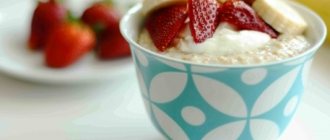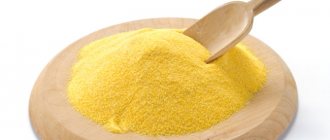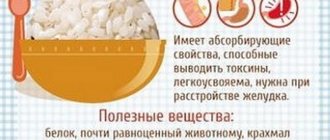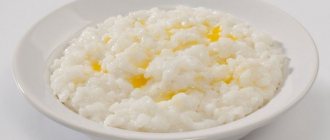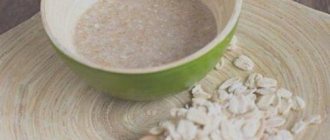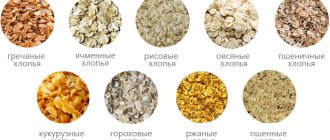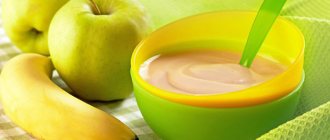Cereal porridges for constipation in children allow you to gently and without the use of drugs restore normal bowel movements. The list of cereals that have a beneficial effect on the intestines is quite large. However, not all of them are suitable for very young children and can even cause the opposite effect, especially when it comes to infants.
Recipes, menus and diet products
What you need to know about cereals
All porridges can be conditionally divided into 2 groups. The first consists of products that can have a bonding effect. This does not mean that they are harmful to health. In case of diarrhea, their inclusion in the child’s diet often helps to solve the problem quickly and without harm to the child’s health. But if the child has the opposite situation - constipation, then they should be excluded from the menu for a while.
The second group is cereals that have a neutral or mild laxative effect on the intestines. In case of stool retention, they should prevail in the daily diet of children.
Strengthening products for breastfeeding
Breastfeeding does not stop if a nursing mother has diarrhea. During this period, a large amount of fluid is recommended (3-3.5 liters per day).
It is also recommended to use rosehip decoction, chamomile flower tea, and low-fat broths.
When breastfeeding, a woman can eat potatoes, meat, and fish without restrictions. For tea you can take a handful of crackers, crackers, toast.
In the first months of a baby’s life, fruits and berries are eaten little by little: they provoke allergies or diarrhea in the child. If you have diarrhea, a nursing mother should avoid eating fresh vegetables and fruits.
Brief characteristics of various cereals
Buckwheat, semolina, millet, oat and barley cereals are considered traditional for the Slavic peoples. Over time, rice and pearl barley were added to them. Recently, flaxseed porridge has become popular, the benefits of which have not yet been proven by scientific research. But the old, good and healthy corn grits have almost disappeared from children's diets.
Buckwheat porridge is the safest product for a child’s body. It contains a lot of fiber and polyunsaturated fats. It is one of the first to be introduced into the diet of babies at the beginning of complementary feeding. Buckwheat is considered one of the best preventive remedies against stomach ulcers and other gastrointestinal diseases. Regular consumption of buckwheat for constipation has a positive effect on intestinal motility.
Acting as a mild natural laxative, buckwheat can improve bowel movements and relieve the child not only from recurring constipation, but even from chronic constipation. Speculation that buckwheat can cause stool retention is unfounded.
Corn porridge is also a good and safe option for starting complementary feeding for babies, although it is used relatively rarely today. The main reason is that too much corn grits can cause diarrhea. But with constipation, its ability to have a laxative effect can and should be in demand. With its help, you can restore the process of defecation without the use of an enema or laxatives.
Millet porridge is another product that has a positive effect on stool retention. Millet has dietary fiber, which, when it enters the intestine, irritates its walls, stimulating bowel movements. In addition, it is easily digested, but at the same time a person retains a feeling of fullness for a long time.
Oatmeal for constipation is a two-faced product. It can either quickly solve a bowel problem or make the situation worse. It all depends on the cooking method. Prepared from whole grains, it is no worse than buckwheat and is capable of establishing trouble-free excretion of feces from the body in a short time. But if you cook it from flour, then the oatmeal itself can cause constipation. Even pediatricians often forget about this property, recommending dry milk formulas with the addition of oatmeal for feeding infants who have problems with difficult bowel movements.
Pearl barley porridge is often recommended at the initial stage of constipation to normalize stool. But you need to take into account that pearl barley contains gluten, which has a gluing ability. If a child has problems with the gastrointestinal tract or a tendency to obesity, then it is better to avoid barley for constipation. And getting children to eat it is not at all easy.
Semolina porridge is the most popular baby food option. However, if a child has a problem with stool, it is one of the most dangerous. Semolina contains a relatively large amount of starch, which has a binding effect on the stomach. Therefore, often young children whose mothers overfeed semolina experience regular constipation.
All caring mothers know about the adhesive properties of rice. Therefore, the question of whether rice can be used for constipation in young children is not even considered by them. But in vain. If you know which varieties of rice can be used to ease bowel movements and which cannot, then rice porridge can bring considerable benefits.
White polished rice should really be excluded from the diet of a constipated person so as not to aggravate the situation. But brown or red rice can be of considerable benefit if the cause of constipation is food or other toxic poisoning.
Fans of using flaxseed porridge for constipation would do well to first find out what it is made from. For its preparation, flax seeds are used. The seeds themselves are actually used in folk medicine as an effective laxative. But how useful they will be for constipation after flaxseed oil is squeezed out of them and turned into cake, it’s hard to say - there are no serious scientific works on this issue yet.
How to cook properly
When discussing the benefits or harms of various cereals for gastric motility, one must take into account that even the healthiest dish ceases to be healthy if it is not prepared correctly. To get rid of constipation, when cooking for children you must:
- cook dishes only in water (do not use fatty broths);
- do not cook with milk (otherwise fiber loses its ability to bind water in the intestines);
- do not add sugar (it causes fermentation in the stomach);
- Introduce porridge into the diet no more than once a day (better for breakfast, acceptable for lunch, harmful for dinner);
- Their portion for babies should be limited to 2-3 tablespoons.
By following these simple rules and knowing which product will be beneficial if delayed, and which will do more harm than help, you can quickly and unnoticed by your child to save him from this unpleasant problem.
Oatmeal weakens or strengthens stool
Oatmeal makes baby's stool stronger or weaker
Oatmeal strengthens or weakens the intestines
Oatmeal porridge is very healthy for both children and adults. It perfectly cleanses the intestines and removes waste and toxins. It is even recommended to eat it in the morning. For some reason I remembered the British
In fact, they don’t eat that much oatmeal there anymore; we Russians are used to this porridge. It makes you weak, so it is recommended to eat it at home so that you don’t catch it somewhere along the way.
Oatmeal is even weaker, almost on par with buckwheat. This is because whole grains contain dietary fiber in large quantities, and they, to put it mildly, drag everything “out”. That’s why it is recommended to eat oatmeal for breakfast to remove all the toxins from the body. If you need to enhance the relaxing effect, then add figs, apples and prunes to the porridge. Oats are widely used to treat the gastrointestinal tract.
Of course, oatmeal weakens and is very good. For those who have problems with bowel movements, instead of taking various tablets at the pharmacy, you should eat oatmeal in the morning and wash it down with green tea. In this case, cleansing the body will be immediate.
Oatmeal itself does not have a pronounced laxative or strengthening effect. It simply normalizes intestinal function. The fact is that barley (oatmeal is “crushed” pearl barley) forms something like mucus. It doesn’t sound very good, but this mucus is very useful: it envelops and protects the intestinal walls, helping it to cleanse itself of food. Because of this property, oatmeal jelly is also useful. Previously, jelly was made from oatmeal, and not at all using starch, as it is now. It was this mucus from boiled pearl barley that ensured the thickness of the jelly.
Thus, oatmeal simply heals the digestive system. If you have problems with stool, oatmeal will help solve them. If the stool is normal, if in general you eat right, then there will be no diarrhea or other troubles from oatmeal. So you can safely give your child oatmeal. Just remember that it belongs to fast carbohydrates, as it is easily digested.
But you have to be careful with pearl barley. Children should not eat pearl barley at all, and some adults do not digest it well. Barley is very healthy, but many are already so accustomed to fast food that their stomach is simply not able to digest whole, dense food like barley.
Oatmeal is oatmeal (oats). Pearl barley (and also barley) is barley groats (barley).
They are not related in any way (except that they are both grains), except that the shape is similar. - 5 months ago
Every nursing mother knows that she needs to carefully monitor her diet. After all, the foods she eats enter the baby’s body along with breast milk. And many foods can negatively affect a baby’s well-being, digestion, and stool. If the baby is already on complementary feeding, in this case you need to carefully select the baby’s diet. In this article we will find out which foods weaken a child's stool.
Can cereal cause constipation?
Before you diversify your menu with cereals to treat constipation, you need to find out which of them will be beneficial and which will be harmful.
Rice contains a lot of starch, which has fixing properties; eating rice porridge during constipation is contraindicated (with the exception of black (wild) rice and unpolished brown rice). It is not recommended to take semolina; it slows down the activity of the gastrointestinal tract and thickens the contents of the intestines.
Constipation can be caused by corn; this effect can occur if you cook stale grains or stale cereals. Individual intolerance or non-compliance with recommended portions can provoke the opposite effect from taking corn grits.
Features of the baby's stool
A baby's stool, especially in the first six months, may be different. Unlike bottle-fed children, it changes regularly in breastfed babies. In newborns, stool can happen 3-16 times a day; with artificial feeding, it happens 2-4 times. After 1.5 months the figure gradually begins to decrease. But even at this age, the baby can “go to the toilet” after each feeding.
After the introduction of complementary foods from six months, the frequency of stool decreases to 1-2 times a week. The smell is usually sour milk or absent altogether. There may be impurities in the form of a small amount of mucus or white lumps. The color and consistency of stool is affected by the foods that the nursing mother and baby eat.
As for color, infants' stool can be of different shades, including yellow, green and orange. With full breastfeeding, the stool is green, with artificial or mixed feeding - brown. At the beginning of complementary feeding, yellow, white and green spots often appear. Stools are affected not only by nutrition, but also by the medications the baby or mother takes while breastfeeding, the frequency of feedings, and the child’s physical activity.
Constipation in a baby
If the baby has bowel movements less than once every 1.5-2 days, and is accompanied by strong straining and straining, we can talk about constipation. Please note that bowel movements should be difficult and distressing for your child. The baby may often be capricious, his health often worsens, abdominal pain and fatigue appear.
Most often, constipation occurs in children under six months of age, since the intestines have not yet strengthened and are not accustomed to new conditions. Do not rush to start treatment, and before using any medications, be sure to consult your pediatrician!
To improve your baby’s bowel movements, review the diet of both the nursing mother and the baby, if he is already on complementary foods. Include laxative foods in your diet when breastfeeding and exclude strengthening ones. Find out what foods cause constipation here.
Constipation can be caused by the wrong mixture. If the baby is bottle-fed or mixed-fed, choose a more suitable diet. Choose the most adapted and hypoallergenic mixtures. With such problems, many nursing mothers choose fermented milk nutrition from Nutrilon, Nan or Nutrilak. Now let’s look at what foods weaken a child’s intestines.
Foods that loosen stools
Easing the stomach is sometimes as necessary as strengthening the stool. Constipation in children is not uncommon.
At these moments, the unknowing mother begins to feed the baby what the relatives advise, who are not always right.
In order not to spoil the digestive system, you should know which drinks and foods can have a laxative effect.
When the intestines are weakened, their peristalsis increases, causing the ability to quickly absorb foods to be temporarily lost.
Below is a table describing the categories of stool loosening products:
| Product category | Kinds |
| Beverages | Kissel made from natural juices can relax the stomach. It's better to make it yourself than to buy a store-bought version. |
| Coffee does not have pronounced properties to cause the desire to empty the stomach. However, due to individual characteristics, with proper nutrition, the effect will be positive | |
| Boiled rose hips, made from seeds and berries, will help solve constipation problems | |
| Milk can cause loose stools even with severe constipation | |
| Fruits | Figs will help in treating intestinal obstruction. By consuming it daily you can forget about constipation forever. |
| A peach grown in favorable regions will help the child empty his intestines. This solution is suitable for mothers of babies experiencing colic and bloating. Complementary feeding in the form of peach puree will become a panacea | |
| Fresh apricots will have a laxative effect if consumed unripe. Dried apricots will help solve the problem in the same way as prunes and dates. Fresh plums have the same properties, but you need to use them in moderation | |
| Berries | Watermelon and its juice are useful for people suffering from constipation. Please note: if you eat the pulp located close to the crusts, there is a chance to cleanse the intestines |
| Ripe blackberries have laxative properties. It is not recommended to use it in large quantities for people suffering from high stomach acidity. | |
| Vegetables | Pumpkin has a dual effect on the intestines. Depending on the individual characteristics of the body, it can strengthen or weaken the stomach |
| Broccoli is given to infants as complementary foods and to relieve bloating. |
Lemon slightly weakens the stomach, but you should not overdo it with this product - if consumed constantly on an empty stomach, lemon can cause gastritis.
Now, knowing which foods strengthen the stool and which cleanse the intestines, you can independently solve the problem of constipation and bloating.
womans7.com
List of laxative foods
- Beets and beet juice;
- Sea kale;
- Pumpkin and zucchini;
- Grapes and grape juice;
- Plum and cherry;
- Apricots and bananas;
- Prunes and dried apricots;
- Fermented milk products (kefir, yogurt, cheese, etc.);
- Oatmeal, corn and buckwheat porridge;
- Vegetable oil;
- Quail eggs.
The effect of laxative products
Keep in mind that the listed products cause a laxative effect in some children, and in some children no effect will be observed. The list includes foods that most often cause a laxative effect. But through trial and error, you can determine which foods are suitable for your baby and include them in your diet. Let's look at the properties and actions of each product.
Beets are a healthy vegetable that weakens and cleanses the body, removes toxins and waste, strengthens blood vessels and improves blood composition. However, this is an aggressive product. It is difficult to digest and can cause allergies. Therefore, a nursing mother can consume beets and beet juice after 3-4 months of lactation, children - after a year and only after heat treatment!
Sea kale is a product rich in iodine. Iodine cleanses the body and removes toxins, improves the functioning of the endocrine system and the thyroid gland. 100 grams of seaweed contains the daily requirement of iodine! In addition, this product contains a large number of vitamins, macro- and microelements, including phosphorus and magnesium.
Seaweed can be consumed by breastfeeding mothers who do not have problems with the functioning of the endocrine system and digestion. The product is also not recommended if there is an excess of iodine in the body, with hemorrhoids and dermatitis. Sea kale can be introduced into the diet during breastfeeding in the third month after the birth of the baby. But it is better not to eat kelp for children until they are three years old, since seafood is difficult to digest and digest in a child’s body.
Zucchini is the healthiest and safest vegetable for breastfeeding, which is easily digestible and does not cause allergies. Therefore, zucchini is included in the diet of a nursing mother already in the first week after childbirth and is recommended to be given to the baby in the first feeding. This is a real source of vitamins, energy and vigor. The low-calorie vegetable cleanses the body, removes toxins and excess fluid, reduces weight and has a positive effect on the functioning of nerve cells.
Pumpkin is a low-calorie vegetable with high nutritional value and nutritional value, which is easily digestible and rarely causes allergies. Pumpkin is included in the diet of a nursing mother by the second month of lactation. Pumpkin puree is given to babies for 8-9 months. This vegetable normalizes digestion, relieves swelling and improves body tone, strengthens the immune system. Pumpkin contains rare vitamin T, which breaks down fats and prevents the formation of lipid deposits during breastfeeding.
Fruits and berries: grapes, apricots and peaches, cherries and plums, banana. The safest one from this list for breastfeeding is banana. Bananas contain vitamins B, E and C. They strengthen the immune system, improve mood and increase body tone.
Bananas can be included in a nursing mother’s diet in the second month of lactation, and other fruits in the third month. Fruit purees are included in complementary foods from the seventh month, starting with peaches and bananas. Then other fruits and berries are gradually introduced. How to properly prepare fruit purees for the first feeding of a baby, see here.
Dried fruits are the most effective foods in the fight against constipation. In addition, they are easier and faster to digest than fresh fruits. Nursing mothers and infants are recommended to eat prunes and dried apricots, which supply the body with vitamins and beneficial elements.
When breastfeeding, dried fruits replace sweets and sugar. And dried fruit compotes have a positive effect on lactation and stimulate the production of breast milk. To prepare food for a baby, prunes and dried apricots must be soaked in water for 1.5-3 hours, then crushed and added to vegetable or fruit purees or porridge.
Fermented milk products must be included in the diet of both nursing mothers and infants. They strengthen the immune system and saturate the body with calcium, which improves the condition of nails, hair and skin. Such food improves digestion and reduces colic, stimulates lactation and improves the composition of breast milk. Nursing mothers can eat cottage cheese and natural yogurt after a week, sour cream after a month, fermented baked milk and yogurt after three months, and kefir after six months.
Porridge is a healthy and nutritious food. The most useful porridges for constipation are corn, oatmeal and buckwheat. First of all, during lactation it is recommended to include buckwheat. It helps with anemia and stimulates the production of breast milk, is easily digestible and improves the condition of hair, skin, and nails. Oatmeal and corn porridge improve digestion, help with stress and cleanse the body.
During lactation, you need to take into account that porridge with milk is introduced into the diet no earlier than 4-5 months. At first, it is better to eat dishes with water and gradually dilute the water with milk. You should prepare porridge for babies in the same way. For taste, add a little breast milk, butter or vegetable oil. Dairy-free porridges are given from 6-7 months, dairy ones - after 8 months.
Quail eggs are a nourishing and dietary product that can replace chicken eggs if you are allergic to protein. Quail eggs are better digestible and more healthy than chicken eggs. This product contains retinol (vitamin A) and B vitamins. Quail eggs strengthen the immune system and improve hormonal levels, restore and stabilize digestion, and stimulate brain activity. Complementary feeding for infants begins with egg yolk from 7-8 months, egg white is recommended to be included only after a year.
Vegetable oil is a healthy product containing vitamins and useful minerals. Vegetable oil improves the functioning of digestion and intestines, lungs and liver. It improves metabolism, lowers cholesterol and has a rejuvenating effect. Vegetable oil can and should be included in the diet of a nursing mother and baby. Oil can be added to cereals and purees for a child from six months of age.
Massage helps with constipation and abdominal pain. It stimulates motor skills, improves gas formation and reduces colic. As a massage, circular movements in a clockwise direction around the navel are suitable. Bend and straighten your legs one by one, pull the bent legs towards your stomach and pull them back. Repeat each exercise five times. Do not forget to place the baby on a hard surface for two to three minutes before each feeding, and after feeding, hold the baby in an upright position until he burps.
Constipation is a problem in the intestines that people do not prefer to talk about out loud, considering difficult and insufficient bowel movements to be something embarrassing. This can explain the delay in visiting the doctor, and the debilitating state of heaviness, pain and the inevitable bad mood that accompany constipation. It’s easy to get rid of such life partners - start living right: move more and eat rationally. Oatmeal is the best helper in this matter. Read more about the peculiarities of eating oatmeal for constipation later in the article.
- Oatmeal strengthens or weakens
- What is useful for constipation
- What type of oatmeal to choose for constipation
- How to cook properly
Mild laxative
Laxative foods are not medicine. They must be eaten regularly to prevent stool from hardening. Diet will help relieve constipation, but it takes time. To solve a delicate problem in a short time, they resort to pharmaceutical products. Which laxative is safe for children?
Fitomucil Norm is a mild laxative. Approved for use by children from three years of age. It contains two natural components: the shell of Psyllium plantain seeds and the pulp of domestic plum fruits. They have several effects at once:
- provide comfortable bowel movement,
- normalize stool frequency,
- removes toxins and carcinogens,
- restore the balance of intestinal microflora.
The product is convenient to give to children. The contents of the bag must be mixed with any drink: kefir, juice, yogurt, etc. Find more detailed instructions for use in the packaging.
Oatmeal strengthens or weakens
Constipation is a problem that often affects both adults and children. A person who suffers from constipation for a long time runs the risk of encountering subsequent diseases not only of the stomach and intestines, but also of experiencing enormous harm to the entire body. Untimely and insufficient defecation leads to the fact that the toxins accumulated in unremoved feces begin to spread throughout all organs and systems, causing serious disruptions in their functioning, and simply poisoning the body. This can be fraught with negative consequences for the cardiovascular and circulatory (including cerebral hemorrhage) systems.
Constipation often causes nervous irritation and mental disorders. Therefore, such a disease cannot be ignored and comprehensive treatment must be started. Anyone who wants to quickly and efficiently achieve positive results in the fight against constipation should normalize their diet and include oatmeal in their diet. The fact is that oats, from which the cereal is made, has a positive effect on the functioning of all inflamed organs and systems. It contains many useful vitamins, microelements and enzymes that the body needs to heal. The fruits of this cereal contribute to the effective absorption of carbohydrates, have a positive effect on the functioning of the heart, blood vessels and nervous system, due to the high content of magnesium. The benefits of oatmeal also lie in the fact that phosphorus, iodine, iron, silicon and essential acids such as pantothenic, nicotinic, lysic increase the body’s immune forces, and also improve the functioning of the musculoskeletal system (and movement is one of the main ways to combat difficult bowel movements). Oatmeal has a laxative effect, which is extremely important for constipation.
But it is worth remembering that it will weaken only if it is used correctly, otherwise you risk causing even more constipation. So, if you introduce instant cereals into your diet, you should be careful, because they can cause constipation. The fact is that the cereals from which they are prepared are amenable to thermal steam treatment and compression under high pressure. This leads to the conversion of useful substances into starch. When consuming flakes containing this element, the body produces sugars, which provoke fermentation, gas formation, begin to harden feces and lead to constipation.
What is useful for constipation
Dietary oatmeal can soften feces, which guarantees their rapid removal from the body. But for this effect you need to eat only porridge made from whole oatmeal. The secret of the beneficial effect of oatmeal on the intestines is that it contains a large amount of fiber, which has a positive effect on peristalsis and works to normalize digestive processes.
Oatmeal envelops the gastrointestinal tract with special mucus (which is explained by the presence of a special substance called beta-glucan in the cereal), thereby preventing irritation, bloating, spasms and flatulence. The microelements and enzymes contained in the composition contribute to the complete absorption of nutrients by the body and the removal of toxins that accumulate during constipation, restoring the balance of microflora and preventing dysbacteriosis.
How to cook properly
Cooking oatmeal does not require any special knowledge or skills. So, you need to take the required amount of cereal and water. Select the ratio based on your own preferences. First, pour the liquid into the pan, put it on the fire and bring to a boil. The next step is adding oatmeal. It will be ready after 10 minutes of boiling. To make dietary porridge tastier, you can add honey, sugar, jam, preserves, various fruits and dried fruits (prunes, dried apricots, dates, pieces of apple, banana, orange).
One of the ways to prevent and eliminate constipation is to normalize your diet. For example, you need to introduce oatmeal into your diet, which will help the intestines work and promote the excretion of feces. Eating oatmeal is beneficial for both adults and children. The main thing is to approach its preparation correctly. And after just a few doses you will feel good.
Does oatmeal strengthen or weaken?
Does oatmeal weaken or strengthen stool?
Does oatmeal strengthen or weaken the stool of a child or an adult?
Does oatmeal strengthen or weaken the intestines?
Oatmeal has nothing to do with pearl barley. Pearl barley is made from whole barley grains. This is what barley looks like.
Oatmeal is made from a completely different crop, oats.
This is what this plant looks like.
There are only two types of oatmeal on sale.
Oatmeal porridge is prepared from oatmeal or flakes.
Now directly on the issue of the benefits (harms) of oatmeal.
Oatmeal contains almost all the essential substances that the human body needs. First of all, these are carbohydrates, which are the building blocks of cells and accelerate the metabolic process (in other words, metabolism). Oats also contain fats, proteins, fiber - all these substances are vital for the human body.
In addition, oatmeal contains an excellent (if not ideal) set of vitamins and micro and macroelements. And when cooked (correctly, of course), oat porridge retains its beneficial properties.
All these advantages have been noted by nutritionists and oatmeal is included in many diets for the treatment or recovery of a person after illness.
This set of substances is programmed by nature itself into oats in such a way that oatmeal stabilizes the human body and the stomach in particular.
Oatmeal does not weaken or strengthen the stomach or intestines; it leads to proper metabolism, eliminating the harmful factor (when there is one and causes diarrhea or, conversely, constipation). Oatmeal stabilizes this phenomenon, even in cases where it is not only temporary, caused by some factor, but also in severe diseases, such as a stomach ulcer.
But this does not mean that oatmeal is a panacea for all diseases.
If you have kidney disease, it is not recommended to consume oatmeal. This is due to the presence of proteins and proteins in oats.
A healthy person is recommended to consume oatmeal 4-5 times a week, preferably at breakfast or lunch).
Does oatmeal strengthen or weaken
Oatmeal, cooked from whole grains, is known to many for its laxative effect. A large amount of dietary fiber will also absorb toxins well and gently remove them. There is no need to talk about the benefits of oatmeal once again - the most wholesome and healthy breakfasts in the world are invariably associated with porridge.
Oatmeal can aggravate the problem of constipation - the viscous consistency is unlikely to move the intestines. Liquid and tender porridges are a medicine for people with gastritis and colitis.
Tenderness in the case of laxative porridges is allowed only in the form of a spoon of vegetable oil. And forget about oatmeal with milk - only water, only whole grains. Milk is generally contraindicated for constipation, as is coffee, by the way.
Oatmeal will help both in the fight against constipation and in improving appearance due to the presence of vitamin H. However, you should not overuse oatmeal, as it interferes with the body's absorption of calcium.
Contraindicated cereals
Some cereals should not be eaten if you are constipated, as they have the opposite effect, causing constipation. They should be avoided during therapy. For example, rice contains a large amount of starch, which has fixing properties. Semolina porridge will also not help with constipation, but will only make it worse.
Constipation occurs from eating corn, which is possible when cooking stale cereals. This can be caused by intolerance to the product and its excessive consumption.
What foods have a laxative effect?
- Buckwheat porridge with stringy meat (with a lot of connective tissue).
- Pearl barley porridge with poultry meat (with skin).
- Barley porridge with fish (with skin).
- Oatmeal with sardines in oil.
- Milk oatmeal porridge.
- Buckwheat porridge with milk.
- Krupenik made from buckwheat with cottage cheese.
- Omelette with asparagus (in olive oil) + rye bread.
- Beetroot soup + bread.
- Buckwheat soup.
- Seaweed salad with corn oil.
- Boiled beetroot salad with sunflower oil.
- Salad of tomatoes, lettuce, onion and cucumber.
- Fresh cabbage and apple salad with flaxseed oil.
- Baked pumpkin with cinnamon. Fresh apples.
- White wines. Beet kvass. Freshly squeezed juices (carrot, beetroot, apricot, potato). Acid whey.
Additionally, see which products are weakened and which are strengthened in this table:
Laxative drinks: recipes
Any freshly squeezed fruit or vegetable juice, decoctions of dried fruits and dried berries have a laxative effect.
It is also useful to drink oil dissolved in water, which will coat the intestinal walls and help move feces.
In addition, it is believed that maintaining a water-salt balance (namely, at least 2 liters of water per day) will help avoid constipation.
What drinks can you drink:
- Beet juice
- Tomato juice
- carrot juice
- Pear juice
- Plum juice
- Dried fruits compote
- Red rowan decoction
- A glass of warm water and 1 tsp. honey
- A glass of warm water and 1 tbsp. linseed oil
- Cucumber juice
- Green tea with milk
- Flaxseed decoction
